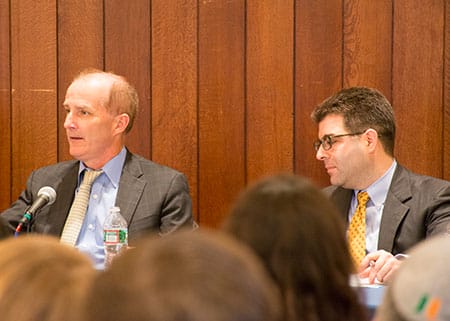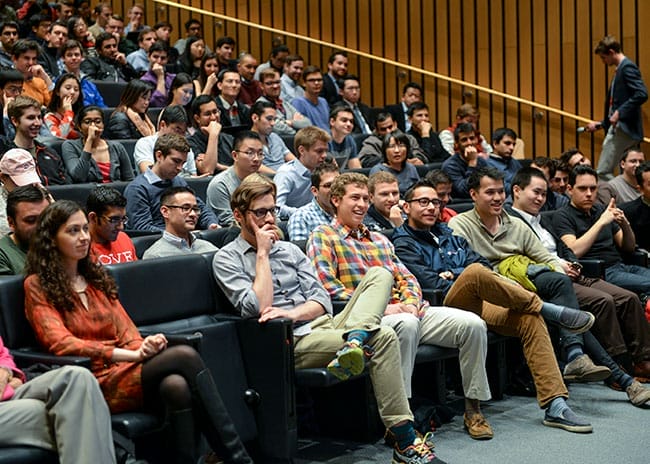One of the best aspects of being on the campus of the University of Pennsylvania is the regular lineup of incredible educational events, outside of the usual classroom lectures. Students flock to these events, and alumni do as well when their busy lives aren’t pulling them in five other directions—either as the speakers themselves or to enjoy the educational content. As evidence of the daily knowledge transference on campus, I present three recent examples: one sponsored by the Initiative for Global Environmental Leadership (IGEL), the second by the Penn Wharton Public Policy Initiative (PPI), and the other by the Risk Management and Decision Processes Center.
As you might expect on a college campus, the discussions at these events were not corporate buttoned-down PowerPoints. The anything-is-possible atmosphere on a campus such as Wharton’s is infectious, as are the idealistic suppositions and rigorously researched assertions that you would expect from students and professors, who are used to the insulation of the Ivory Tower’s walls. But from CEOs? Federal regulators? Yes, from them as well.
Take the March 18 luncheon presentation by John S. Shegerian, the co-founder, CEO and chairman of Electronic Recyclers International Inc., sponsored by IGEL. Shegerian rolled up his sleeves figuratively speaking (he was wearing a three-piece suit) and had at the topic at hand: electronic recycling and e-waste. He saved his most enthusiastic lines for the biggest purchaser of electronics in the United States: the federal government. The U.S. government has no unified, clear requirement for e-waste management despite its level of consumption. (According to what the Government Accountability Office reported in 2012, the federal government had been discarding as many as 10,000 computers each week. Data points on the exact size and scope of federal e-waste are hard to come by, but that one certainly raises eyebrows.)
What signal does that send about the importance of sustainability? What national secrets, stored on old hard drives and servers, end up in landfills or, worse, are shipped overseas to be reused or stripped?
Disclosure: In the audience for Shegerian’s presentation was an Environmental Protection Agency official, who explained that the General Services Administration does have voluntary guidelines for recycling, and the EPA is working to make them mandatory across departments.

David Crane, CEO of NRG Energy (left), and Benjamin Nussdorf, a senior regulatory adviser for the U.S. Department of Energy, at the March Penn Wharton Public Policy Initiative event. Photo credit: Lisa Marie Patzer.
In the meantime, leadership on e-waste has instead come from the private sector. Shegerian used Staples as an example. The retailer had been offering electronics recycling in stores since 2005. The stores do $8 billion in annual sales online, however, and 65 percent of the Fortune 500 are clients—so the company realized the potential in an online recycling program. Partnering with Electronic Recyclers International, the office supplies retailer launched such a system last July and corporate customers have embraced it, according to Shegerian (though he didn’t cite quantifiable proof).
In another example of great on-campus educational content, the PPI hosted “The Future of U.S. Energy: Business and Policy Perspectives” on March 31. The discussion featured David Crane, CEO of NRG Energy, and Benjamin Nussdorf, a senior regulatory adviser for the U.S. Department of Energy.
Disclosure: In contradiction of my previous statement about the infectiousness of campus’ open atmosphere, the PPI participants requested that details of their conversation be off the record.
That said, what most amazed about their conversation was its frankness. The discussion ranged from the slowness of regulators to react to new technologies, to whether regulators are too cozy with the industries they oversee. From U.S. energy companies having to come to grips with consumers who care where their energy comes from. To natural gas not being the long-term solution to a sustainable energy policy.
Wharton Magazine was fortunate enough to attend a third campus event in March on a related topic. Wharton’s Risk Management and Decision Processes Center brought together three lead authors from the newly released Fifth Assessment Report (AR5) of the Intergovernmental Panel on Climate Change (IPCC), which provides the latest in climate change science and risk perceptions. Moderated by Center Co-Director Howard Kunreuther, Wharton’s James G. Dinan Professor of Decision Sciences & Public Policy, this panel discussed frankly (and for some, depressingly) the chances of limiting carbon emissions enough to avoid the worst-case scenarios of climate change.
Luckily for all interested parties, the climate change policy discussion was recorded and is available here: http://bit.ly/1FVRI1j.
The purpose of these events is to deliver thought leaders to campus and generate a churn of ideas, of course, but to also disseminate that knowledge as widely as possible. If you can be on campus to witness all this firsthand, cheers to you. If you need a medium such as Wharton Magazine or another school outlet to bring you the content, that works too. But do come back to campus as soon as you can to experience these idea exchanges for yourself … “soon” being the word to stress. Amazingly, classes will already be over by the end of April and things get a lot quieter around here in the summer.
























